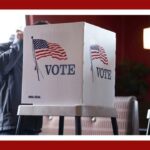

Former Gov. Eric Greitens (R-MO) has maintained his lead in Missouri’s Republican primary contest for the U.S. Senate, and his support amongst primary voters has expanded, according to the latest numbers from a private survey the Greitens campaign exclusively shared with Breitbart News.
The survey has reached out to a staggering 513,245 voters as of Friday night, engaging 23 percent of the half a million individuals in live phone calls. Of the more than 100,000 live voters contacted, a strong 34 percent say they are supporting Greitens in the primary, giving him a four percentage point lead over his next closest competitor, Missouri Attorney general Eric Schmitt, who took 30 percent of the response. Rep. Vicky Hartzler (R-MO), whom former President Donald J. Trump has said he is not endorsing, received support from 21 percent of poll participants.
Each of the three candidates gained one percentage point in support from numbers Breitbart News published from the same running survey Friday, which covered figures tabulated as of Thursday night. It showed Greitens at 33 percent, Schmitt at 29 percent, and Hartzler at 20 percent. In other words, no one has gained ground on Greitens. Undecided voters made up 12 percent of the response as of Thursday’s numbers published on Friday, but the latest information reveals the demographic is starting to dwindle with Tuesday’s election just days out. Currently, 10 percent of respondents are unsure who they will back.
Moreover, support for candidates outside of Greitens, Schmitt, and Hartzler is shrinking as well, going from six percent on Thursday to five percent on Friday.
The 23 percent of live voters engaged is up from 20 percent on Thursday. Of the remaining 77 percent of voters who the survey reached out to, 29 percent did not answer but were left voicemails, 25 percent did not answer and did not have a voicemail established, and 11 percent were undecided as to if they would vote in the primary. Another eight percent refused to say who they were voting for, and four percent of those contacted were wrong numbers.




